一般将来时的用法
英语一般将来时的用法
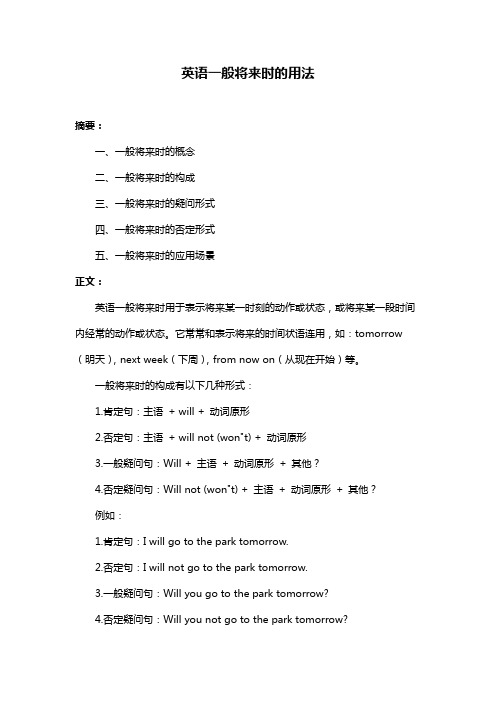
英语一般将来时的用法
摘要:
一、一般将来时的概念
二、一般将来时的构成
三、一般将来时的疑问形式
四、一般将来时的否定形式
五、一般将来时的应用场景
正文:
英语一般将来时用于表示将来某一时刻的动作或状态,或将来某一段时间内经常的动作或状态。
它常常和表示将来的时间状语连用,如:tomorrow (明天),next week(下周),from now on(从现在开始)等。
一般将来时的构成有以下几种形式:
1.肯定句:主语+ will + 动词原形
2.否定句:主语+ will not (won"t) + 动词原形
3.一般疑问句:Will + 主语+ 动词原形+ 其他?
4.否定疑问句:Will not (won"t) + 主语+ 动词原形+ 其他?
例如:
1.肯定句:I will go to the park tomorrow.
2.否定句:I will not go to the park tomorrow.
3.一般疑问句:Will you go to the park tomorrow?
4.否定疑问句:Will you not go to the park tomorrow?
一般将来时在实际应用中非常广泛,可以用于描述未来的计划、预期、愿望等。
一般将来时用法总结
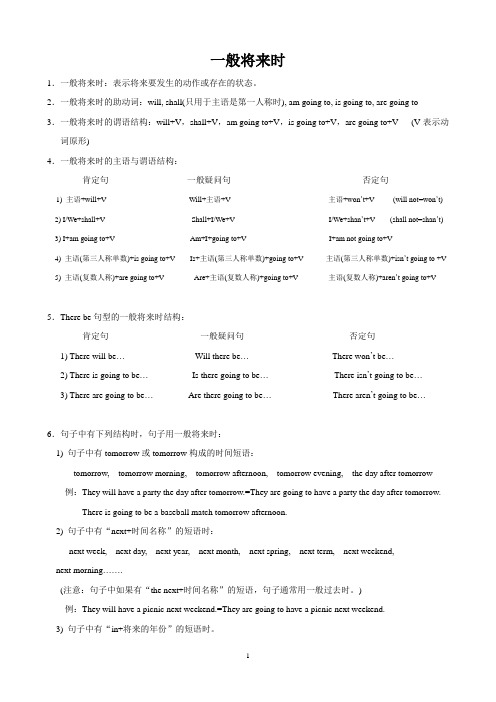
一般将来时1.一般将来时:表示将来要发生的动作或存在的状态。
2.一般将来时的助动词:will, shall(只用于主语是第一人称时), am going to, is going to, are going to3.一般将来时的谓语结构:will+V,shall+V,am going to+V,is going to+V,are going to+V (V表示动词原形)4.一般将来时的主语与谓语结构:肯定句一般疑问句否定句1) 主语+will+V Will+主语+V 主语+won’t+V (will not=won’t)2) I/We+shall+V Shall+I/We+V I/We+shan’t+V (shall not=shan’t)3) I+am going to+V Am+I+going to+V I+am not going to+V4) 主语(第三人称单数)+is going to+V Is+主语(第三人称单数)+going to+V 主语(第三人称单数)+isn’t going to +V5) 主语(复数人称)+are going to+V Are+主语(复数人称)+going to+V 主语(复数人称)+aren’t going to+V5.There be句型的一般将来时结构:肯定句一般疑问句否定句1) There will be…Will there be…There won’t be…2) There is going to be…Is there going to be…There isn’t going to be…3) There are going to be…Are there going to be…There aren’t going to be…6.句子中有下列结构时,句子用一般将来时:1) 句子中有tomorrow或tomorrow构成的时间短语:tomorrow, tomorrow morning, tomorrow afternoon, tomorrow evening, the day after tomorrow 例:They will have a party the day after tomorrow.=They are going to have a party the day after tomorrow.There is going to be a baseball match tomorrow afternoon.2) 句子中有“next+时间名称”的短语时:next week, next day, next year, next month, next spring, next term, next weekend,next morning…….(注意:句子中如果有“the next+时间名称”的短语,句子通常用一般过去时。
一般将来时态用法

一般将来时态用法一般将来时表示在将来某个时间要发生的动作或存在的状态。
一. 一般将来时的基本用法:表示“纯粹的将来”:①表示将要发生的动作或情况,常带有表示将来的时间状语,如tomorrow, next week, in two days, from now on 等。
如:It will be fine tomorrow. 明天天气晴朗。
②表示预料将要发生的动作或情况。
如:You will feel better after having this medicine. 吃了这药,你就会感觉好些的。
二. 一般将来时的构成:1. 由助动词“ shall/ will +动词原形”构成,shall 用于第一人称,will 用于第二、第三人称,而美式英语在陈述句中无论什么人称,一律用will. 表示“带有情态意义的将来”,用来表示意图,用will 来表示。
如:I will be more careful next time. 下次我要更加小心。
I won't go shopping this afternoon, but she will. 今天下午我不想去购物,但她想去。
2. will 在疑问句中,用来表示有礼貌地征询对方的意见。
如:Will you have some more tea 要不要再喝点茶What shall we do this weekend 本周末我们要干什么3. 一般将来时的否定和疑问形式:一般将来时的否定形式是will not ,缩写为won't; shall not ,缩写为shan't 。
一般将来时的疑问形式是把will/ shall 提到主语前。
如:He won’t go to th e park this Sunday. 本周日他不去公园。
Will you go swimming with me 和我一起去游泳好吗4. shall只用于第一人称,如用于第二、第三人称,就失去助动词的意义,已变为情态动词,试比较: He shall come. 他必须来。
完整版)一般将来时基本用法
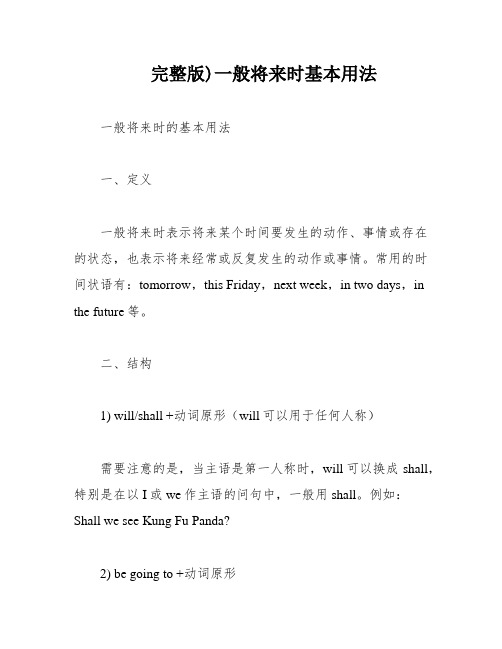
完整版)一般将来时基本用法一般将来时的基本用法一、定义一般将来时表示将来某个时间要发生的动作、事情或存在的状态,也表示将来经常或反复发生的动作或事情。
常用的时间状语有:tomorrow,this Friday,next week,in two days,in the future等。
二、结构1) will/shall +动词原形(will可以用于任何人称)需要注意的是,当主语是第一人称时,will可以换成shall,特别是在以I或we作主语的问句中,一般用shall。
例如:Shall we see Kung Fu Panda?2) be going to +动词原形例如:I’m going to play the piano。
be going to和will的区别be going to和will的用法虽然都表示将来发生动作或情况,一般情况下能互换。
但它们的用法是有区别的。
be going to主要用于:1、表示事先经过考虑、安排好打算、计划要做的事情。
例如:Dad and I are going to watch an opera this afternoon.2、表示根据目前某种迹象判断,某事非常有可能发生。
例如:Look。
There come the dark clouds。
It is going to rain.三、一般疑问句和否定句一般疑问句:1) will/shall +动词原形(will可以用于任何人称)——在will后加not2) be going to +动词原形——在be后加not例如:She will come back in three days.Will she not come back in three days?They are going to clean their classroom.Are they not going to clean their classroom?否定句:1) will/shall +动词原形(will可以用于任何人称)——将will提前2) be going to +动词原形——将be提前例如:She will come back in three days.She will not come back in three days.Will she come back in three days?XXX is whether they will actually do it。
一般将来时的基本结构和用法
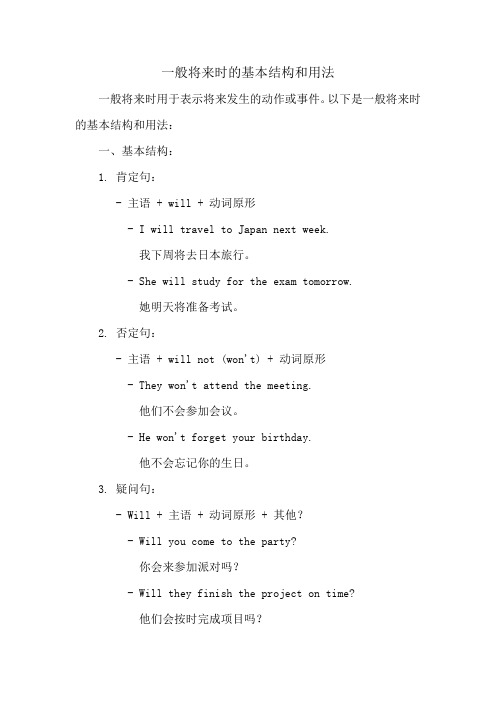
一般将来时的基本结构和用法
一般将来时用于表示将来发生的动作或事件。
以下是一般将来时的基本结构和用法:
一、基本结构:
1. 肯定句:
- 主语 + will + 动词原形
- I will travel to Japan next week.
我下周将去日本旅行。
- She will study for the exam tomorrow.
她明天将准备考试。
2. 否定句:
- 主语 + will not (won't) + 动词原形
- They won't attend the meeting.
他们不会参加会议。
- He won't forget your birthday.
他不会忘记你的生日。
3. 疑问句:
- Will + 主语 + 动词原形 + 其他?
- Will you come to the party?
你会来参加派对吗?
- Will they finish the project on time?
他们会按时完成项目吗?
二、用法:
- 表示将来发生的动作或事件。
- 表示预测、承诺、意图、计划等将来的行为或状态。
- 通常与表示将来时间的时间状语连用,如 tomorrow, next week, in the future 等。
值得注意的是,一般将来时通常用于与将来相关的动作和事件,而对于已经计划或安排好的未来事件,可以使用 "be going to" 结构。
一般将来时的使用方法是什么
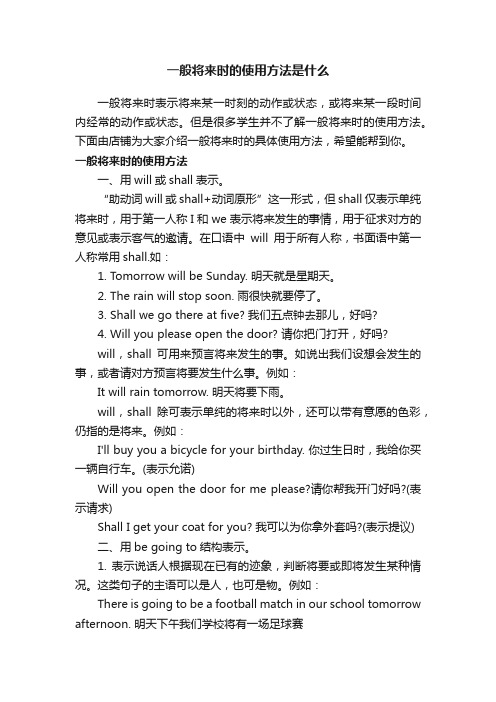
一般将来时的使用方法是什么一般将来时表示将来某一时刻的动作或状态,或将来某一段时间内经常的动作或状态。
但是很多学生并不了解一般将来时的使用方法。
下面由店铺为大家介绍一般将来时的具体使用方法,希望能帮到你。
一般将来时的使用方法一、用will或shall表示。
“助动词will或shall+动词原形”这一形式,但shall 仅表示单纯将来时,用于第一人称I和we表示将来发生的事情,用于征求对方的意见或表示客气的邀请。
在口语中will用于所有人称,书面语中第一人称常用shall.如:1. Tomorrow will be Sunday. 明天就是星期天。
2. The rain will stop soon. 雨很快就要停了。
3. Shall we go there at five? 我们五点钟去那儿,好吗?4. Will you please open the door? 请你把门打开,好吗?will,shall可用来预言将来发生的事。
如说出我们设想会发生的事,或者请对方预言将要发生什么事。
例如:It will rain tomorrow. 明天将要下雨。
will,shall除可表示单纯的将来时以外,还可以带有意愿的色彩,仍指的是将来。
例如:I'll buy you a bicycle for your birthday. 你过生日时,我给你买一辆自行车。
(表示允诺)Will you open the door for me please?请你帮我开门好吗?(表示请求)Shall I get your coat for you? 我可以为你拿外套吗?(表示提议)二、用be going to结构表示。
1. 表示说话人根据现在已有的迹象,判断将要或即将发生某种情况。
这类句子的主语可以是人,也可是物。
例如:There is going to be a football match in our school tomorrow afternoon. 明天下午我们学校将有一场足球赛(已有告示)I feel terrible.I think I'm going to die. 我感到难受极了,我想我快不行了。
一般将来时用法
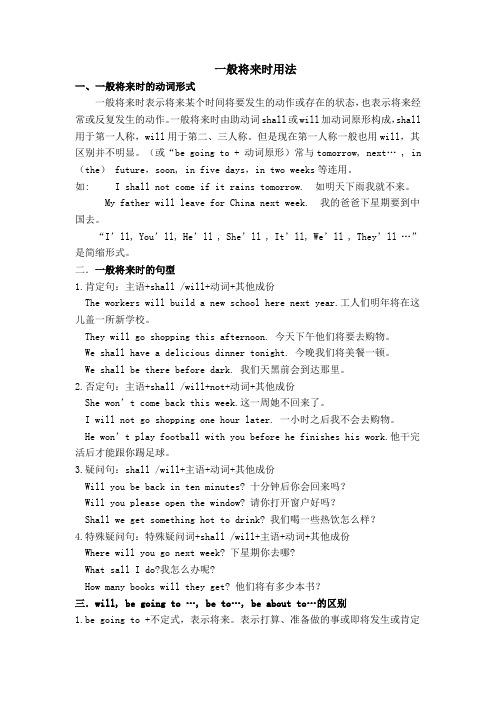
一般将来时用法一、一般将来时的动词形式一般将来时表示将来某个时间将要发生的动作或存在的状态,也表示将来经常或反复发生的动作。
一般将来时由助动词shall或will加动词原形构成,shall 用于第一人称,will用于第二、三人称。
但是现在第一人称一般也用will,其区别并不明显。
(或“be going to + 动词原形)常与tomorrow, next… , in (the) future,soon, in five days,in two weeks等连用。
如: I shall not come if it rains tomorrow. 如明天下雨我就不来。
My father will leave for China next week. 我的爸爸下星期要到中国去。
“I’ll, You’ll, He’ll , She’ll , It’ll, We’ll , They’ll …”是简缩形式。
二.一般将来时的句型1.肯定句:主语+shall /will+动词+其他成份The workers will build a new school here next year.工人们明年将在这儿盖一所新学校。
They will go shopping this afternoon. 今天下午他们将要去购物。
We shall have a delicious dinner tonight. 今晚我们将美餐一顿。
We shall be there before dark. 我们天黑前会到达那里。
2.否定句:主语+shall /will+not+动词+其他成份She won’t come back this week.这一周她不回来了。
I will not go shopping one hour later. 一小时之后我不会去购物。
He won’t play football with you before he finishes his work.他干完活后才能跟你踢足球。
一般将来时的四个句型结构
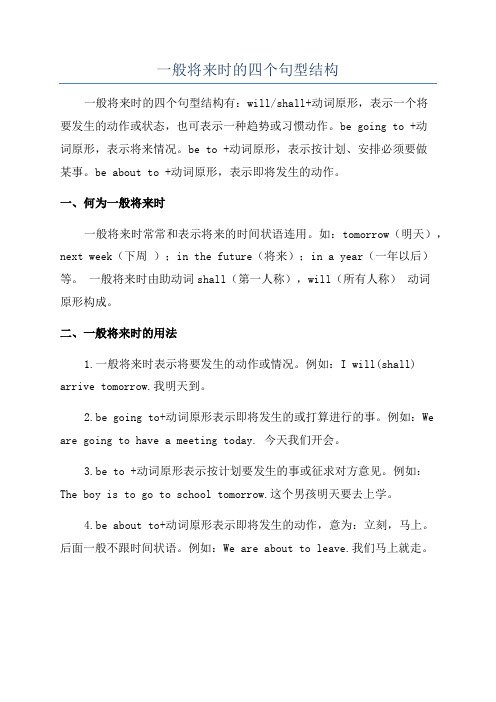
一般将来时的四个句型结构
一般将来时的四个句型结构有:will/shall+动词原形,表示一个将
要发生的动作或状态,也可表示一种趋势或习惯动作。
be going to +动
词原形,表示将来情况。
be to +动词原形,表示按计划、安排必须要做
某事。
be about to +动词原形,表示即将发生的动作。
一、何为一般将来时
一般将来时常常和表示将来的时间状语连用。
如:tomorrow(明天),next week(下周);in the future(将来);in a year(一年以后)等。
一般将来时由助动词shall(第一人称),will(所有人称)动词
原形构成。
二、一般将来时的用法
1.一般将来时表示将要发生的动作或情况。
例如:I will(shall) arrive tomorrow.我明天到。
2.be going to+动词原形表示即将发生的或打算进行的事。
例如:We are going to have a meeting today. 今天我们开会。
3.be to +动词原形表示按计划要发生的事或征求对方意见。
例如:The boy is to go to school tomorrow.这个男孩明天要去上学。
4.be about to+动词原形表示即将发生的动作,意为:立刻,马上。
后面一般不跟时间状语。
例如:We are about to leave.我们马上就走。
一般将来时的用法
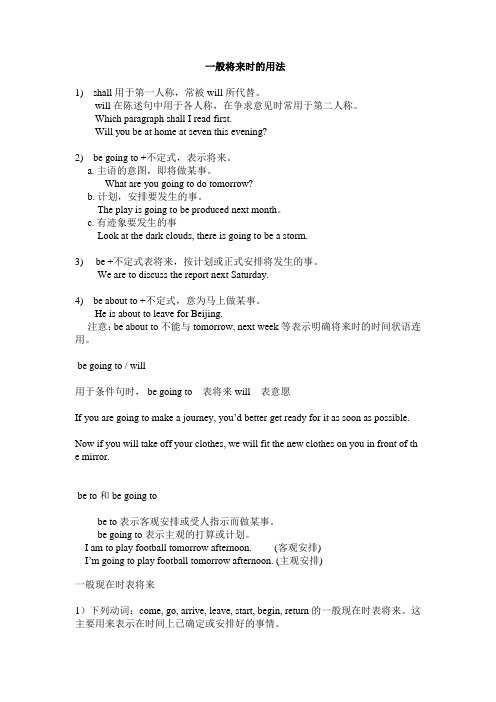
一般将来时的用法1)shall用于第一人称,常被will 所代替。
will 在陈述句中用于各人称,在争求意见时常用于第二人称。
Which paragraph shall I read first.Will you be at home at seven this evening?2)be going to +不定式,表示将来。
a. 主语的意图,即将做某事。
What are you going to do tomorrow?b. 计划,安排要发生的事。
The play is going to be produced next month。
c. 有迹象要发生的事Look at the dark clouds, there is going to be a storm.3) be +不定式表将来,按计划或正式安排将发生的事。
We are to discuss the report next Saturday.4)be about to +不定式,意为马上做某事。
He is about to leave for Beijing.注意:be about to 不能与tomorrow, next week 等表示明确将来时的时间状语连用。
be going to / will用于条件句时, be going to表将来 will表意愿If you are going to make a journey, you’d better get ready for it as soon as possible.Now if you will take off your clothes, we will fit the new clothes on you in front of th e mirror.be to和be going tobe to 表示客观安排或受人指示而做某事。
be going to 表示主观的打算或计划。
一般将来时用法总结
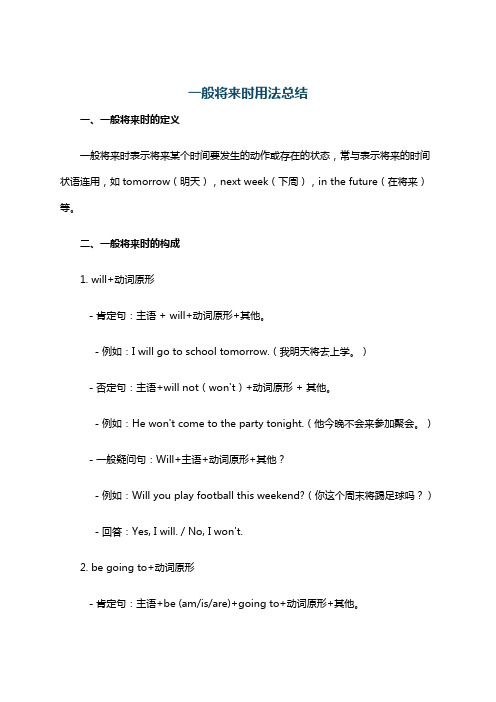
一般将来时用法总结一、一般将来时的定义一般将来时表示将来某个时间要发生的动作或存在的状态,常与表示将来的时间状语连用,如tomorrow(明天),next week(下周),in the future(在将来)等。
二、一般将来时的构成1. will+动词原形- 肯定句:主语 + will+动词原形+其他。
- 例如:I will go to school tomorrow.(我明天将去上学。
)- 否定句:主语+will not(won't)+动词原形 + 其他。
- 例如:He won't come to the party tonight.(他今晚不会来参加聚会。
) - 一般疑问句:Will+主语+动词原形+其他?- 例如:Will you play football this weekend?(你这个周末将踢足球吗?) - 回答:Yes, I will. / No, I won't.2. be going to+动词原形- 肯定句:主语+be (am/is/are)+going to+动词原形+其他。
- 例如:She is going to visit her grandparents next month.(她打算下个月去看望她的祖父母。
)- 否定句:主语+be (am/is/are)+not+going to+动词原形+其他。
- 例如:They are not going to have a meeting this afternoon.(他们今天下午不打算开会。
)- 一般疑问句:Be (am/is/are)+主语+going to+动词原形+其他?- 例如:Are you going to do your homework tonight?(你今晚打算做你的家庭作业吗?)- 回答:Yes, I am. / No, I'm not.三、一般将来时的用法1. 表示将来的计划或打算(be going to侧重于计划打算;will侧重于意愿)- I'm going to study hard this term.(我打算这个学期努力学习。
一般将来时的用法
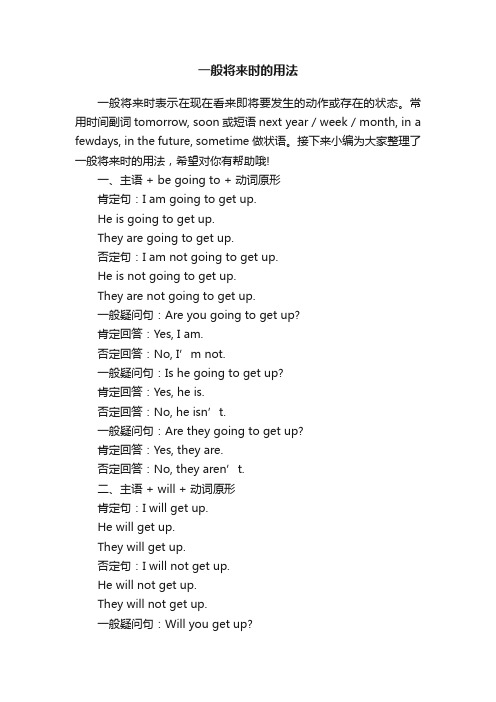
一般将来时的用法一般将来时表示在现在看来即将要发生的动作或存在的状态。
常用时间副词tomorrow, soon或短语next year / week / month, in a fewdays, in the future, sometime 做状语。
接下来小编为大家整理了一般将来时的用法,希望对你有帮助哦!一、主语 + be going to + 动词原形肯定句:I am going to get up.He is going to get up.They are going to get up.否定句:I am not going to get up.He is not going to get up.They are not going to get up.一般疑问句:Are you going to get up?肯定回答:Yes, I am.否定回答:No, I’m not.一般疑问句:Is he going to get up?肯定回答:Yes, he is.否定回答:No, he isn’t.一般疑问句:Are they going to get up?肯定回答:Yes, they are.否定回答:No, they aren’t.二、主语 + will + 动词原形肯定句:I will get up.He will get up.They will get up.否定句:I will not get up.He will not get up.They will not get up.一般疑问句:Will you get up?肯定回答:Yes, I will.否定回答:No, I won’t.一般疑问句:Will he get up.肯定回答:Yes, he will.否定回答:No, he won’t.一般疑问句:Are they going to get up?肯定回答:Yes, they are.否定回答:No, they aren’t.一般将来时/式(The Simple Future tense)时态定义be going to表主观的打算shall和will常常缩写成'll ,紧接在主语之后。
六种常用一般将来时表示法
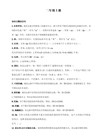
——No, he will not.不,他不会。
注意:在书面语中,主语是第一人称I(We)时,常用shall,即I(We)+shall+动词原形,也可用will。
例如:Shall we have any class tomorrow?明天我们有课吗?
——Yes,we will(we shall).是的,我们明天有课。
10. She_____(have)a concert the next year.
Keys:1、will…arrive 2、will be 3、am going to buy 4、are to 5、will not take
6、has, will go 7、come 8、returns, will let 9、will send, are 10、will have
一、常用表示法:
1、be going to+动词原形
表示将要发生的事,或打算、计划、决定要做的事情时,其肯定式:主语 + be + gong to do ;
疑问式:be + 主语 + gong to do ;否定式:主语 + be + gong to do。其中:be(am/is/are) 随主语人称而变化。
一般将来时的用法

一般将来时一、基本内容1.构成:“助动词will+ 动词原形”2。
含义及用法:一般将来时表示将来某个时间将要发生的动作或存在的状态,也表示将来经常或反复发生的动作。
3。
时间状语:一般将来时常与表示将来的时间状语连用,如:tomorrow, next week,next year, in the future等。
Eg: They will visit Shanghai next week。
People will have robots in their homes in the future.二、句型转化1、肯定句:“主语+will +动词原形+其他。
” Eg: They will have a test next week。
2、否定句:在will 后加 not ,即“主语+won't +动词原形+其他.”Eg: She will be an engineer.(改为否定句)She won’t be an engineer。
3、一般疑问句:将will提到主语前面,即“Will+ 主语+动词原形+其他?"回答时使用yes/no。
Eg: He will live in New York in 10 years. (改为一般疑问句并作肯定回答)Will he live in New York in 10 years? Yes, he will.三、注意事项1、Will 常表示客观的将来,也可表示“带意愿色彩的将来”,也可表示“委婉客气的邀请或命令”Eg: He will be 18 years olds next month.下个月他将满18岁。
I will tell you all about it. 我愿意把所有与此相关的事都告诉你。
Will you please close the door? 请你把门关上好吗?2、在疑问句中,主语为第一人称(I 和we)时,常用助动词shall。
一般将来时的基本用法

一般将来时的基本用法
1. 一般将来时可以用来表示计划呀!比如说,“我明天要去看电影”。
看,这就是我计划好的事情,这就是一般将来时的魅力所在呀,不是吗?
2. 它还能表达决定哟!就像“她决定下周去旅行”。
哇,一个决定就这样轻松地用一般将来时表达出来了呢!
3. 对未来的预测也少不了一般将来时呀!好比说“明天会下雨”。
这是不是很神奇,能对还没发生的事情做出预测呢!
4. 一般将来时还可以用在承诺上呢!像“我会好好爱你”。
多么温暖人心的承诺呀!
5. 表示即将要做的事也很棒呀!“火车马上要开了”。
紧张的感觉一下就有了呢!
6. 那种很肯定会发生的事也能用呀!例如“他明年一定会毕业”。
多明确呀!
7. 一般将来时在日常对话中也超常用呢!“你下班后要干什么”。
这不就是平常我们会问的问题嘛!
8. 它还能用来表达命令呢!“你明天必须把作业交上来”。
是不是感觉有点小压力啦!
9. 连愿望也可以用一般将来时呢!“我希望将来能成为一名科学家”。
这就是心中美好的憧憬呀!
总之,一般将来时真的太好用啦,在各种情境中都能发挥很大的作用呢!能表达这么多不同的意思,简直就是英语时态中的小明星呀!。
一般将来时的用法
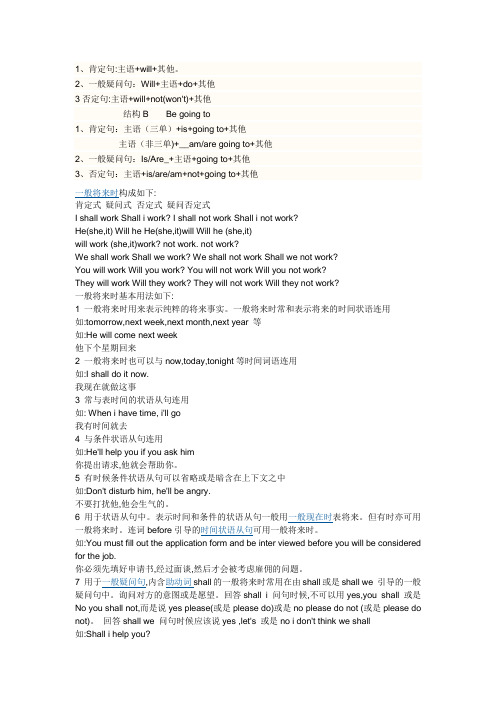
1、肯定句:主语+will+其他。
2、一般疑问句:Will+主语+do+其他3否定句:主语+will+not(won't)+其他结构B Be going to1、肯定句:主语(三单)+is+going to+其他主语(非三单)+__am/are going to+其他2、一般疑问句:Is/Are_+主语+going to+其他3、否定句:主语+is/are/am+not+going to+其他一般将来时构成如下:肯定式疑问式否定式疑问否定式I shall work Shall i work? I shall not work Shall i not work?He(she,it) Will he He(she,it)will Will he (she,it)will work (she,it)work? not work. not work?We shall work Shall we work? We shall not work Shall we not work?You will work Will you work? You will not work Will you not work?They will work Will they work? They will not work Will they not work?一般将来时基本用法如下:1 一般将来时用来表示纯粹的将来事实。
一般将来时常和表示将来的时间状语连用如:tomorrow,next week,next month,next year 等如:He will come next week他下个星期回来2 一般将来时也可以与now,today,tonight等时间词语连用如:I shall do it now.我现在就做这事3 常与表时间的状语从句连用如: When i have time, i'll go我有时间就去4 与条件状语从句连用如:He'll help you if you ask him你提出请求,他就会帮助你。
一般将来时

一般将来时一、一般将来时的用法1.一般将来时表示将来某个时间要发生的动作或存在的状态2.也表示将来经常或反复发生的动作二、句式结构三、注意点1.shall 仅表示单纯将来时,用于第一人称I和we,作为will的一种替代形式。
以You and I为主语时通常避免用shall2.be going to往往表示事先经过考虑的打算。
will多表示意愿、决心。
两者有时不能互换。
There is going to be a football match in our school tomorrow afternoon.明天下午我们学校将有一场足球赛。
(已有告示)Look at the dark clouds, there is going to be a storm.看那乌云,快要下雨了。
He isn't going to see his elder brother tomorrow.他明天不准备去看他哥哥。
3.go,come,start,move,sail,leave,arrive,stay等可用进行时态表示按计划即将发生的动作。
例如:I'm leaving for Beijing.我要去北京。
四、与一般将来时有关的词1.this afternoon(今天下午), this evening 今天晚上this week(本周), thisweekend(本周末), this Sunday(这个周日), tonight(今晚)2.tomorrow(明天), tomorrow morning / afternoon …,the day after tomorrow(后天)3.next week(下周), next month(下个月), next year(明年), next term(下学期), next Sunday(下周日)4.in+一段时间:in two days(两天以后), in a week(一周以后), in two minutes(在二分钟后), in an hour (一小时后), in the future(将来)5.in +将来的时间:in 2010(在2010年)6.from now on (从现在开始), soon,before long 不久,at once(立刻,马上)一般将来时课堂练习一、翻译1.我打算明天和朋友去野炊。
一般将来时的用法

一般将来时的用法一般将来时表示将来某一时刻的动作或状态,或将来某一段时间内经常的动作或状态。
一般将来时的用法有哪些呢?本文是店铺整理一般将来时的用法的资料,仅供参考。
一般将来时的用法一般将来时表示将来某一时刻的动作或状态,或将来某一段时间内经常的动作或状态.常常和表示将来的时间状语连用.如:tomorrow(明天),next week(下周),from now on(从现在开始);in the future(将来)等.一般将来时由助动词shall(第一人称),will(第二、三人称) 动词原形构成.美国英语则不管什么人称,一律用will.用法:(1)一般将来时表示将要发生的动作或情况.例如:I will(shall) arrive tomorrow.我明天到.Will you be free tonight?你今晚有空吗?We won’t (shan’t) be busy this evening.我们今晚不忙.(2)在一般将来时的句子中,有时有表示将来时间的状语,有时没有时间状语,这时要从意思上判断是否指未来的动作或情况.例如:Will she come?她(会)来吗?We’ll only stay for two weeks.我们只待两星期.The meeting won’t last long.会开不了多久.(3)在以第一人称I或we作主语的问句中,一般使用助动词shall,这时或是征求对方的意见(a),或是询问一个情况(b):a.Where shall we meet?我们在哪儿碰头?b.Shall we have any classes tomorrow?明天我们有课吗?在这类问句中,近年来也有不少人用will,特别是在美国.例如:How will I get there?我怎么去?(4)be going to 动词原形 a.表示计划、打算、准备做的事.例如:We are going to put up a building here.我们打算在这里盖一座楼.How are you going to spend your holidays?假期你准备怎样过?b.表示即将发生或肯定要发生的事.例如:I think it is going to snow.我看要下雪了.There’s going to be a lot of trouble about this.这事肯定会有很多麻烦.一般将来时的其他用法一般将来时表示将来某一时刻的动作或状态,其表达形式除了“shall(第一人称),will(第二、三人称)+动词原形构成”外,还有以下几种形式.一.“be going to+动词原形”表示即将发生的或最近打算进行的事.例如:①It is going to rain.要下雨了.②We are going to ha ve a meeting today.今天我们开会.二.go,come,start,move,sail,leave,arrive,stay,live,fly,等可用进行时态表示按计划即将发生的动作,例如:I'm leaving for Beijing.我要去北京.三.“be to+动词原形”表示按计划要发生的事或征求对方意见.例如:①Are we to go on with this work?我们继续干吗?②The boy is to go to school tomorrow.这个男孩明天要去上学.四.“be about to+动词原形”表示即将发生的动作,意为:很快,马上.后面一般不跟时间状语.例如:We are about to leave.我们马上就走.五.某些词,如come,go,leave,arrive,start,get,stay ,live,fly等的一般现在时也可表示将来.①The meeting starts at five o'clock.会议五点开始.②He gets off at the next stop.他下一站下车.六.“be due to"构成的谓语,意味“定于…”也可表示将来时.百度百科上有详细介绍,很全面的哦.一般将来时基本用法一般将来时构成如下:肯定式疑问式否定式疑问否定式I shall work Shall i work? I shall not work Shall i not work? He(she,it) Will he (she,it) He(she,it)will not Will he (she,it) not We shall work Shall we work? We shall not work Shall we not work? You will work Will you work? You will not work Will you not work? They will work Will they work? They will not work Will they not work?其结构有如下几种: 1)will + 动词原形(will可以用于任何人称) 需要注意的是当主语是第一人称时will可以换成shall,特别是在以I或we 作主语的问句中,一般用shall. 例. Shall we go to the zoo? 2)be going to +动词原形第一种结构的句式变化是: 变否定句在will后边加not. 变一般疑问句把will提前. e.g. She will come back in three days. She will not come back in three days. Will She come back in three days? 第二种结构的句式变化要在be上做文章. E.g. They are going to clean their classroom. They are not going to clean their classroom. Are they going to clean their classroom?一般将来时基本用法如下:1 一般将来时用来表示纯粹的将来事实。
一般将来时用法

一般将来时用法一、一般将来时的动词形式一般将来时表示将来某个时间将要发生的动作或存在的状态,也表示将来经常或反复发生的动作。
will, be going to …, be to…, be about to都可以用来表示一般将来时。
一般将来时由助动词shall或will加动词原形构成,shall用于第一人称(____________,_______________),will用于第二、三人称。
但是现在第一人称一般也用will,其区别并不明显。
(或“be going to + 动词原形)常与tomorrow, next… , in (the) future,soon, in five days,in two weeks等连用。
如: I shall not come if it rains tomorrow. 如明天下雨我就不来。
My father will leave for China next week. 我的爸爸下星期要到中国去。
“I’ll, You’ll, He’ll , She’ll , It’ll, We’ll , They’ll …”是简缩形式。
二.一般将来时的句型1.肯定句:主语+shall /will+动词+其他成份The workers will build a new school here next year.工人们明年将在这儿盖一所新学校。
They will go shopping this afternoon. 今天下午他们将要去购物。
We shall have a delicious dinner tonight. 今晚我们将美餐一顿。
We shall be there before dark. 我们天黑前会到达那里。
2.否定句:主语+shall /will+not+动词+其他成份She won’t come back this week.这一周她不回来了。
I will not go shopping one hour later. 一小时之后我不会去购物。
- 1、下载文档前请自行甄别文档内容的完整性,平台不提供额外的编辑、内容补充、找答案等附加服务。
- 2、"仅部分预览"的文档,不可在线预览部分如存在完整性等问题,可反馈申请退款(可完整预览的文档不适用该条件!)。
- 3、如文档侵犯您的权益,请联系客服反馈,我们会尽快为您处理(人工客服工作时间:9:00-18:30)。
一般将来时的用法
高中英语时态有好多种,有一般现在时,一般过去时,现在进行时……今天小编要为大家讲解的是过去将来时的用法,希望能够为大家在学习英语的过程中减少一定的阻力。
1. 过去将来时的定义
过去将来时主要用于表示过去某个时候看来即将发生的动作或存在的状态。
如:He said he would come here next Friday. 他说他下周星期五来这儿。
I knew that he would help us when we were in trouble. 我知道当我们陷入困境时它会帮助我们。
2. 过去将来时的结构
would + 动词原形。
如:She told us that she would try her best to catch up with other classmates this term. 她告诉我们说她将一切努力在本期赶上其他同学们。
When you asked Li Lei for help, he would never refuse you. 过去当你请她帮忙时,他绝不会拒绝。
was / were going to + 动词原形。
如:He told us that he was going to attend the meeting. 他告诉我说他要参加那次会议。
He said that I was going to be sent to meet her at the railway station. 他说将要拍我去火车站接她
was / were to + 动词原形。
如:The building was to be completed next month. 这座建筑改在下个月竣工。
Li Lei was to arrive soon. 李蕾很快就要到了。
was / were about to + 动词原形。
如:We were about to leave there when it began to rain heavily and suddenly. 就在我们要离开时,天突然下起了大雨。
He was about to have lunch when the bell rang. 就在他要吃中饭的时候,门铃响起来了。
was / were +现在分词。
如:He was leaving the next day. 他第二天要走了。
We were informed that the leaders were coming to our school soon. 我们接到通知说领导们很快要来我们学校。
3. 过去将来时的用法
过去将来时,一般用于主句为过去时的宾语从句中。
如:He said he would stay with us. 他说他要与我们呆在一起。
He said he would never go there again. 他说他绝不会再去那儿。
过去将来时,用于虚拟语气中,如:If I were you, I would not do that. 要是我是你的话,我就不会那样做。
If he were here, he would show us how to do it. 如果他在这儿,他就会向我们展示该如何做了。
4. 拓展was / were going to + 动词原形;was / were to + 动词原形;was / were about to + 动词原形等结构都可表达当时一种未曾实现的意图或打算。
如:The conference was going to be held the next month. 会议下个月开。
We were to have our class at eight. 八点我们该上课了。
I was about to tell him about it when Wu Dong got in. 就在我要告诉他时,吴东进来了。
